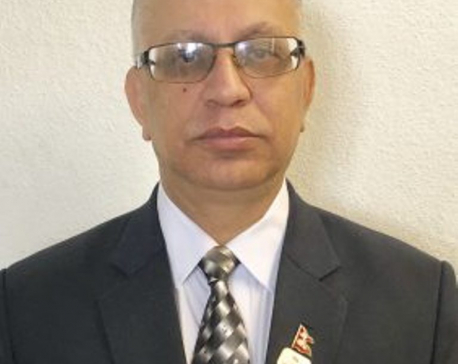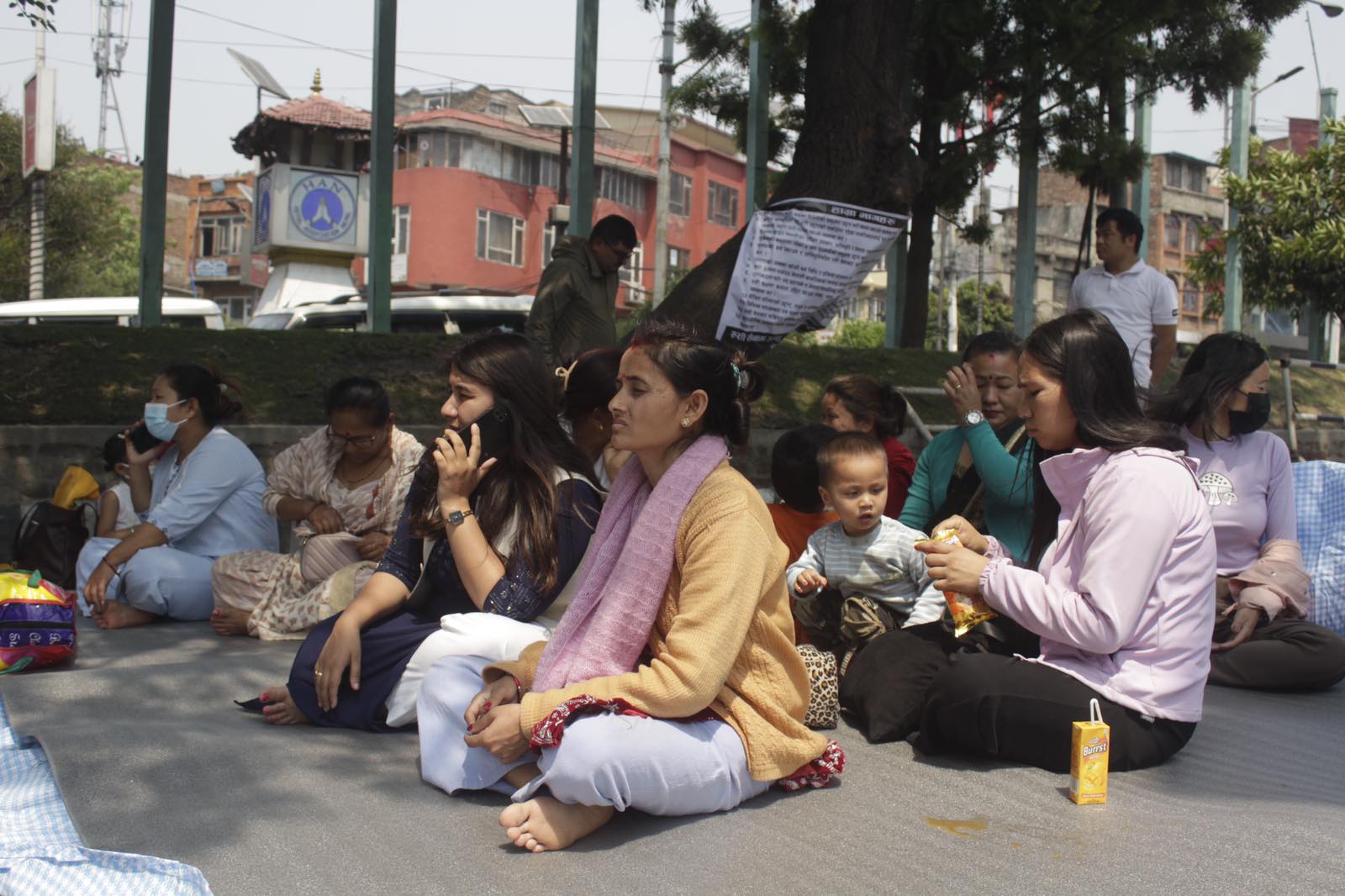
OR
Intelligence and Nepal’s foreign policy
Published On: February 13, 2020 10:11 AM NPT By: Dinesh Bhattarai


Dinesh Bhattarai
Dinesh Bhattarai, former diplomat and foreign policy expert, has served as the foreign affairs adviser of former prime ministers Sher Bahadur Deuba and Sushil Koirala.news@myrepublica.com
Continued neglect of intelligence in foreign policy formulating process has helped foreign intrigues to, what BP Koirala warned in 1976, make “Nepal a center of international conspiracy”
Intelligence is one of the least prioritized areas in Nepal’s foreign policy. In fact, intelligence is in a state of utter neglect. Inputs and insights into major decisions from the intelligence community appear to be nil in this country. Decisions with far-reaching implications are made “in spite of, not because of intelligence.”
Intelligence analysis is the heart and soul of national efforts to understand and predict the trend of world events. Our inability to read, analyze, dissect and then adapt to the fast-evolving international environment in a way to suit our national interests will yield space to outsiders. We cannot afford the misreading and misjudgments of the rapidly moving geopolitical dynamics around us. In such a situation, continued neglect of intelligence in foreign policy formulating process has helped the foreign intrigues to, what BP Koirala warned way back in 1976, make “Nepal a center of international conspiracy.”
Deep chasms
Partisanship in Nepal’s foreign policy has been higher. A quick look at the diplomatic swings of government leaders and political parties in and out of power presents an agonizing picture. It is excruciating to write that there has been a long-term trend of acrimonious polarization along party lines in foreign policy debates. Whether in power or out of power, they should resist politicizing intelligence, and close the deepening partisan divides. Their double speaks on issues of national interests and security leaves outsiders wondering about credibility of our commitment and integrity of character. This is worrisome. This polarization undercuts the much-needed national consensus in Nepal’s foreign policy and creates tough situation for foreign policy makers to figure out a best response. Experts’ reports are ignored. There seems to be little clarity between vital interests from vested interests. We should not confuse our neighbors, friends and well-wishers with our ambiguities.
Mistakes come from misinformation. Authoritarianization of democratic politics worsens the situation further. What is needed is an integrated perspective on intelligence on foreign policy. Intelligence requires a conscious effort and a multidimensional strategic plan including effective representation in international forums, innovative diplomatic practices, effective communication tools and persuasive narratives and contents. Government should put mechanisms in place that are equipped with adequate resources and are capable and competent to anticipate, identify, dissect, measure and mitigate emerging threats to people and the nation. Government’s threat lens should sharply focus on a holistic perspective.
In this time of uncertainty and turmoil, decision making process needs informed opinion and precise intelligence to avoid many embarrassing moments. Intelligence collection, especially foreign intelligence collection, is completely a different job and requires sophisticated mechanisms. Given the geostrategic situation that Nepal is in, the challenge is to traverse a difficult terrain, and earn the trust of two big neighbors, and remain constructively engaged with the larger international community. Nepal needs diversified diplomatic relations. There is always a challenge to ensure how these relations go practical and become mutually beneficial.
Diplomats are nation’s eyes and ears. The country is yet to realize that diplomats working in several stations in Nepali missions abroad are not there for pleasure and comfort. They stand alert for 24 hours, send their inputs back home for shaping foreign policy, work to sell nation’s foreign policy, and carry it out in the most creative and effective ways. Nation’s pride and role in the world do not depend on falsehoods and double standards. For a country like Nepal, professional diplomacy, clarity and consistency are important. Even in this age of unprecedented advances in digital technology and artificial intelligence that has shrunk time and distance with swifter communication, diplomacy remains the first line of defense, development and dignity. Notwithstanding rapid innovations and transformations, diplomats’ job is still to report home what is being done overseas and to bring home the story of distant governments and people and their perceptions and information for the country. They also educate hosts how to understand our perceptions and views. Diplomats work hard to tell the home government “what lies behind the language,” used and its possible implications on Nepal.
There is an increasing tendency in Nepal to look to outsiders and the country continues to excessively depend on foreign economic resources. Nepal should be extraordinarily careful of what comes into the country, what goes where, for what purpose, how it is used and on whom. The inflow of external resources in the country has created, as BP Koirala warned back in 1980, a “new class of people whose affluence is unrelated to the general economic condition of the nation as a whole.” “The new class is neither feudal nor capitalist,” said BP, “which has least roots in the economic soil of the country. This new class has no economic roots in the country. It exists solely on the basis of the manipulation of foreign aid, and through corruption, illegal trade etc.” International actors exercise more influence in such a situation.
Nepal first
While it is absolutely essential to have goodwill, cooperation and support of foreign friends and well-wishers from the international community, it is equally essential that their assistances are fully aligned to the national priorities and pressing needs of the country and use of such aid is fully regulated and monitored by national institutions to make it complementary to national efforts. For the sake of clarity, consistency, credibility and strength of national position, for a country like Nepal, anything foreign has to be routed through Ministry of Foreign Affairs. Particularly during the decade-long Maoist conflict and protracted transition, several foreign factors and actors made entrance into the country under various covers. Nepal’s neighbors China and India have risen, and their rise has been at the center of global attraction. As Nepal sits between them, there is increasing attention on it. There is a need for quality research and competing reporting system on developments in the neighborhood and beyond and their possible implications on Nepal.
Intelligence community will have to understand deeply complex and interrelated challenges. This demands the most insightful intelligence analysis. There should be a practice of daily briefing to the executive with assessments and possible results. While policy makers deserve good intelligence, they also need to stand ready to learn. There is a considerable disconnect between reality and rhetoric, and lack of coordination among the government agencies with right hand not knowing what the left hand does. In a country where knowledge is taken to ex-officio with positions, policy makers shape intelligence rather than the informed intelligence influencing the policy. There are no attempts to fill this gap as government spends very little in knowledge generating process. Even government think-tanks stand starved of necessary resources. Country has dedicated National Intelligence Department (NID) as main intelligence agency. Apart from NID, security agencies like Nepal Army and Nepal Police have their own intelligence gathering units and dedicated wings. As the pressing needs for intelligence increase, these institutions need to be adequately equipped and suitably restructured without any delay to suit the needs of the 21st century in the context of rapidly changing geopolitics of the areas that surround Nepal. It is time to focus on building apolitical institutions as a foundation to good intelligence and good decision making at all moments by bringing the most relevant global insights into the process for analysis.
You May Like This

VIDEO: Diplomacy in the time of coronavirus: Johnson and Macron trade bows, thumbs up
LONDON, June 19: Standing apart on either side of a strip of red carpet outside Number 10 Downing Street, Prime Minister... Read More...

Ambassador Bhattarai presents credentials to Swiss President
KATHMANDU, June 26: Nepal's Ambassador to Switzerland Mani Prasad Bhattarai presented his credentials to President of the Swiss Confederation Ueli... Read More...

Kautilayan diplomacy
Indian Prime Minister Narendra Modi has been applying the four famous tactics of Kautilya with abandon ... Read More...

Just In
- Govt padlocks Nepal Scouts’ property illegally occupied by NC lawmaker Deepak Khadka
- FWEAN meets with President Paudel to solicit support for women entrepreneurship
- Koshi provincial assembly passes resolution motion calling for special session by majority votes
- Court extends detention of Dipesh Pun after his failure to submit bail amount
- G Motors unveils Skywell Premium Luxury EV SUV with 620 km range
- Speaker Ghimire administers oath of office and Secrecy to JSP lawmaker Khan
- In Pictures: Families of Nepalis in Russian Army begin hunger strike
- New book by Ambassador K V Rajan and Atul K Thakur explores complexities of India-Nepal relations














_20240419161455.jpg)


Leave A Comment